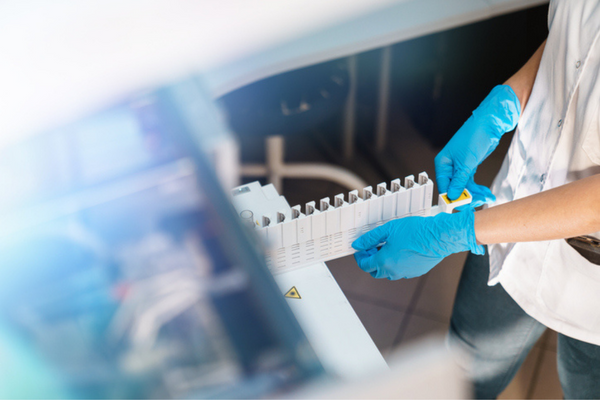
Key Takeaways:
- The impact of digitalization on R&D
- How the timeline for commercialization effects innovation
- Soft skills to develop for success
What technology trends are you following most closely, with an eye toward how they may impact the work of your scientists, and FMC’s future growth?
One of the technologies that I follow closely is the application of data science and machine learning to chemical discovery. This is a very active and collaborative area of research where data scientists, chemists and biologists all need to work together to make progress, determine which data to use, and how to use it best. Finding lasting results at the intersection of disciplines is always tough, but I am sure we will learn many new things while looking to extract signal from noise.
It is also fascinating to watch the intersection of machine learning and mechanical engineering as it applies to development and application of sensors, drones, and robots in the agricultural space. And I always look forward to learning something new from the scientists in our chemical genomics group.
Talk about the metaphorical “one that got away.” Is there a project that eluded you? Why? And if you could return to it, what would you do differently?
Great question—it made me reflect that I tend to focus on problems that are in front of me, using past experiences to learn from, but not to dwell on. If there’s a common theme, it is that I try to look for biases in my decision-making and always watch for those in my current work. The trial-and-error nature of discovery helps us find new and interesting problems, so I am always thinking of the next project to pursue.
Over the next five years, what do you project will be the biggest impact of digitalization on your team’s operations? And what about on farmers?
I think we will all become better at using data to make decisions. This is already happening in our industry everywhere: from R&D labs to farmers. There will be more sensors on farms with several years’ worth of trends for growers. R&D organizations will become better at collecting useful data and learning from it. This is not to say that uncertainty and risk will go away, but our decision-making will become more robust.
Do you agree or disagree with the following statement: “New families of insecticides and fungicides are more readily discovered than new families of herbicides, which are more difficult to discover, develop and produce.”
I think it is just plain hard to discover a new commercially successful family of crop protection compounds regardless of the pest. A lot depends on where the research organization places its focus. Almost ten years ago, our R&D team made a strategic decision to focus on discovery of new herbicides, a decision that paid off with the discovery of Tetflupyrolimet. This is the first herbicide with a novel mode of action in thirty years. It controls grass as well as key broadleaf weeds and sedges in the rice market and is slated to launch in 2023.
What are the biggest challenges confronting farmers that the average person has little appreciation for?
Emergence of resistance as a threat to food production may not be widely appreciated. Resistant pests can lower crop yields significantly and require a lot of effort to control. It typically takes several solutions to get resistance under control: monitoring, changes in the way crop protection agents are applied, new formulations and the introduction of new modes of action.
How did your family influence your leadership style?
I grew up in a family of mechanical engineers and academics, so there was always focus on technical rigor and excellence. Surrounded by so many engineers, I was always aware of practical implications of academic research. It was also clear to me that a lot of industrial applied research is done by teams of scientists and that collaboration is very important in successful teams.
With respect to your FMC scientists, what non-technical skills do you most highly value?
I look for the person’s ability to work in interdisciplinary teams. Such work requires many non-technical skills, including the ability to communicate effectively, ability to listen carefully, desire to learn something new, patience, and capability to build trust.
What’s the most significant sustainability issue confronting your team? And what is your plan to address it?
In Discovery Research, we work on projects that are five to ten years away from commercialization. We need to be aware not only of the challenges growers face today, but also of the issues that might become important in the future. They may be related to emergence of new pests, development of resistance or registrability. We address these sustainability issues through diversification of our pipeline, bias towards new modes of action and close connection with our commercial teams and growers.
Given the importance of food to human life, and the projections for population growth, do governments – generally speaking - invest appropriately in agricultural research?
It’s an important question. In developed or high-income countries, the level of public investment in agricultural research has been declining for the last 15-20 years, while the level of private investment has been increasing. This presents significant challenges in the long run, especially in countries with growing populations.
Public investment in agricultural research improves agricultural productivity and food security. Without robust public support, the pace of fundamental discoveries in agriculture, chemistry and biology will slow, and it will be very difficult to close the gap with only private investment. Public investment can also have a direct impact on a country’s food security and agricultural practices through Ag extensions and experimental stations.
To thank you for contributing to ACS Boss Talk, ACS is going to buy you 250 acres of farmland anywhere in the world. Where will you farm, and what will you grow?
Thank you! I am married to an avid gardener and obviously my passion is chemistry, so you probably are not making a good investment here. I was always fascinated by fermentation and I enjoy a good glass of wine—how about some grape-friendly land in Oregon?

Seva Rostovtsev, Ph.D.
Seva Rostovtsev was born in Tula, Russia, and received his undergraduate degree in Chemistry in 1996 at the Higher Chemical College in Moscow, Russia. He then moved to the United States and obtained an M.S. degree in Chemistry at the University of Nebraska, Lincoln. He kept moving west and joined the Bercaw group at the California Institute of Technology, where he worked on C-H bond functionalization with platinum and received his Ph.D. in 2001. As a post-doc in the Sharpless lab at The Scripps Research Institute, Seva was one of the co-inventors of copper click chemistry.
He joined DuPont Central Research in 2003 where he worked on a number of projects ranging from oxygen scavenging with laccases to synthesis of OLED materials. Seva moved to DuPont Crop Protection in 2013 to manage a group in Chemical Process Development, followed by management assignments in Technology Assessment and Discovery Chemistry. He is currently the Director of Discovery Chemistry at FMC Agricultural Solutions. He has published 9 papers and is a co-inventor of over 20 patents.
This article has been edited for length and clarity. The opinions expressed in this article are the author's own and do not necessarily reflect the view of their employer or the American Chemical Society.
Copyright 2022 American Chemical Society (All Rights Reserved)













